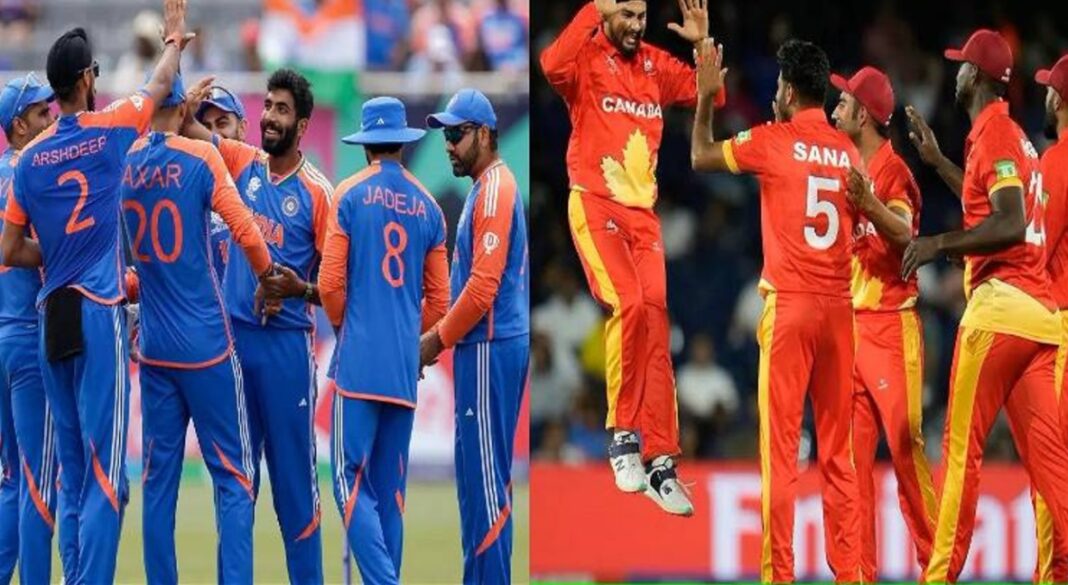Introduction: India National Cricket Team vs Canada National Cricket Team Timeline
Cricket, often regarded as a religion in India, holds a significant place in the hearts of millions of fans across the country. The India National Cricket Team has a rich history and a legacy that spans over decades, with numerous achievements in various formats of the game. On the other hand, the Canada National Cricket Team, while not as prominent on the global stage, has had its moments of glory and continues to develop as a competitive cricketing nation.
The encounters between these two teams, though not as frequent as others, provide an interesting contrast between a cricketing giant and an emerging team. This article delves into the timeline of matches and interactions between the India National Cricket Team and the Canada National Cricket Team, highlighting key moments and significant events.
Timeline of Matches and Interactions
| Date | Match Format | Venue | Result | Key Highlights |
|---|---|---|---|---|
| 1979 | ICC Trophy | England | India won by 4 wickets | India’s first official match against Canada in ICC events. |
| 2003 | ICC World Cup | South Africa | India won by 7 wickets | India’s dominant performance with the ball, dismissing Canada for 36 runs. |
| 2011 | ICC World Cup | India | India won by 5 wickets | India chased down Canada’s target comfortably, leading to an easy victory. |
| 2018 | Cricket World Cup Qualifier | Zimbabwe | India won by 7 wickets | India secured a spot in the Super Six stage with a convincing win. |
Table of Contents
Early Encounters: The 1979 ICC Trophy
The first official encounter between the India National Cricket Team and the Canada National Cricket Team occurred during the 1979 ICC Trophy in England. This was a significant event as it marked the beginning of Canada’s journey in international cricket. The tournament was organized to provide a platform for Associate Members of the International Cricket Council (ICC) to compete for a place in the 1979 Cricket World Cup.
India, already an established cricketing nation, entered the match as overwhelming favorites. Canada, on the other hand, was a relatively unknown entity in the cricketing world. Despite the disparity in experience and skill levels, the match was keenly contested. India eventually emerged victorious, winning the match by 4 wickets. This victory set the tone for India’s subsequent performances in ICC events, while Canada gained valuable experience on the international stage.
The 2003 ICC World Cup: A One-Sided Affair
The next significant encounter between India and Canada took place during the 2003 ICC World Cup in South Africa. By this time, India had established itself as one of the top cricketing nations in the world, with a strong and experienced squad. Canada, though still developing as a cricketing nation, was eager to make an impact on the global stage.
The match, held at Boland Park in Paarl, turned out to be a one-sided affair. India’s bowlers, led by pace spearhead Javagal Srinath, produced a clinical performance, dismissing Canada for a paltry 36 runs. This remains one of the lowest totals in World Cup history. In response, India chased down the target with ease, winning the match by 7 wickets. This victory further solidified India’s reputation as a cricketing powerhouse, while Canada was left to reflect on the challenges of competing at the highest level.
2011 ICC World Cup: A Comfortable Victory for India
The 2011 ICC World Cup was a momentous occasion for Indian cricket, as the tournament was co-hosted by India, Sri Lanka, and Bangladesh. India’s clash with Canada in the group stage was one of the many matches that generated excitement among fans.
The match, held at the M. Chinnaswamy Stadium in Bangalore, saw Canada put up a competitive total of 183 runs. India’s response was measured and composed, with Sachin Tendulkar and Yuvraj Singh playing key roles in the run chase. India eventually won the match by 5 wickets, ensuring their progression to the knockout stages. For Canada, this match was another valuable learning experience, as they continued to develop their skills and gain exposure on the international stage.
2018 Cricket World Cup Qualifier: A Crucial Win for India
In 2018, the India National Cricket Team and the Canada National Cricket Team faced off once again, this time in the Cricket World Cup Qualifier held in Zimbabwe. This tournament was critical for both teams, as it offered a pathway to qualification for the 2019 ICC Cricket World Cup.
India entered the match with a clear objective: to secure a place in the Super Six stage. Canada, despite being the underdog, was determined to put up a strong fight. The match was closely contested, with both teams displaying resilience and skill. However, India’s experience and depth in batting proved to be the difference, as they chased down Canada’s target with 7 wickets in hand. This victory was crucial for India’s World Cup aspirations, while Canada gained further exposure to high-level competition.
Evolution of the Canada National Cricket Team
The Canada National Cricket Team has come a long way since its early days of international cricket. While the team has faced numerous challenges in competing against top-tier nations like India, there have been significant strides in the development of cricket in Canada. The Canadian cricket board has invested in grassroots development, infrastructure, and coaching, with the aim of nurturing young talent and expanding the reach of the sport across the country.
Canada’s participation in ICC events, such as the World Cup and the ICC Trophy, has provided the team with valuable experience and exposure. The team has also benefited from the presence of players with international experience, who have helped mentor younger players and elevate the overall standard of cricket in Canada.
India’s Dominance in International Cricket
The India National Cricket Team’s dominance in international cricket is well-documented. With a rich history that includes multiple World Cup victories, Champions Trophy wins, and consistent performances in Test cricket, India has established itself as a cricketing powerhouse. The team’s success can be attributed to a combination of factors, including a strong domestic cricket structure, a steady pipeline of talented players, and a passionate fan base that supports the team through thick and thin.
India’s encounters with teams like Canada serve as a reminder of the vast disparity in skill and experience between the top cricketing nations and emerging teams. However, these matches also provide an opportunity for emerging teams to learn from the best and improve their own game.
The Significance of India-Canada Matches
While the matches between India and Canada may not be as high-profile as some of India’s other international encounters, they hold significance in the broader context of cricket development. For Canada, playing against a team like India provides invaluable experience and exposure to high-level competition. These matches also offer Canadian players the chance to test their skills against some of the best cricketers in the world.
For India, matches against teams like Canada offer an opportunity to experiment with team combinations, give younger players a chance to gain experience, and fine-tune their strategies ahead of more challenging encounters. These matches also serve as a reminder of India’s responsibility as a cricketing giant to support the growth and development of the sport in emerging nations.
Key Players in India-Canada Encounters
Over the years, several players have made significant contributions to the matches between India and Canada. For India, players like Sachin Tendulkar, Yuvraj Singh, and Javagal Srinath have played pivotal roles in securing victories. Tendulkar’s experience and skill in handling pressure have often been a deciding factor in India’s success against Canada.
On the Canadian side, players like Ashish Bagai, John Davison, and Henry Osinde have stood out for their performances. Bagai, a former captain and wicketkeeper-batsman, has been a key figure in Canada’s cricketing journey, providing stability and leadership on and off the field. John Davison, known for his explosive batting, made headlines during the 2003 World Cup with a record-breaking century against the West Indies. Henry Osinde, a fast bowler, has been a consistent performer for Canada, often leading the bowling attack with pace and precision.
Challenges Faced by the Canada National Cricket Team
The Canada National Cricket Team has faced several challenges in its quest to establish itself as a competitive cricketing nation. One of the primary challenges is the lack of regular international exposure and competitive matches against top-tier teams. While participation in ICC events has provided some opportunities, the frequency of these encounters is limited, making it difficult for the team to maintain consistency and build momentum.
Another challenge is the availability of resources and infrastructure for cricket development in Canada. Unlike traditional cricketing nations, where the sport enjoys widespread popularity and support, cricket in Canada is still growing in terms of grassroots participation and fan engagement. The Canadian cricket board has been working to address these challenges by investing in coaching, facilities, and youth development programs, but there is still a long way to go.
The Future of India-Canada Cricket Relations
As the Canada National Cricket Team continues to develop and gain experience, there is potential for more frequent and competitive encounters between India and Canada in the future. The growth of cricket in Canada, coupled with the increasing popularity of the sport among the Canadian diaspora, could pave the way for more bilateral series, exhibition matches, and collaborations between the two countries.
For India, supporting the development of cricket in countries like Canada aligns with the broader goal of expanding the global reach of the sport. By sharing knowledge, resources, and expertise, India can play a crucial role in helping emerging cricketing nations like Canada achieve their full potential.
Conclusion
The timeline of matches between the India National Cricket Team and the Canada National Cricket Team highlights the contrasting paths of two cricketing nations. While India has established itself as a dominant force in international cricket, Canada is still in the process of developing its cricketing identity and competing at the highest level.
The encounters between these two teams, though infrequent, offer valuable lessons and insights into the challenges and opportunities faced by emerging cricketing nations. As cricket continues to grow globally, the relationship between India and Canada will play a vital role in shaping the future of the sport.

